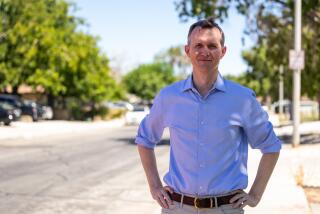Angelides Reveals 7 Years’ Worth of His Tax Returns
- Share via
SACRAMENTO — State Treasurer Phil Angelides, campaigning for governor, released seven years of tax returns Thursday showing that his income totaled $11.6 million and he paid $3.4 million in state and federal taxes.
Although he is a millionaire, Angelides, who built his wealth in real estate in the Sacramento area, is the least wealthy of the three main gubernatorial candidates.
His annual income averaged $1.66 million between 1998 and 2004. The high was 2003, when his adjusted gross income was $3.4 million. The low was $782,000 in 1999.
He paid $2.4 million in federal income taxes and $1.03 million in state taxes, and gave $211,000 to charities, or about 1.8% of his income. He has not filed his 2005 tax return, which is due next month.
Angelides’ decision to unveil his returns followed a more extensive release by his wealthier Democratic rival, state Controller Steve Westly.
On Thursday, Westly and Angelides squabbled over who was being more open. But even as they sniped at each other, the fact that the main Democratic candidates have opened their personal tax returns adds pressure on Gov. Arnold Schwarzenegger to follow their lead.
“It is the appropriate thing to do -- and the governor ought to do the same,” Angelides’ spokesman Brian Brokaw said. “The governor ought to meet our very high level of disclosure.”
Schwarzenegger released two years of tax returns during the 2003 recall campaign. His aides did not comment Thursday, except to say in an e-mail that the governor would release tax records “soon.”
There is no legal requirement for candidates to release tax returns, but it has become tradition that they do so.
As big as Angelides’ numbers may seem, they pale next to Westly’s. The controller, who made his fortune as an early executive at online auction house EBay, released 10 years of tax returns in September, showing that his gross income was $225.8 million. He paid $63.5 million in state and federal taxes in the 10-year period ending in 2004, or about 28% of his earnings.
Westly has called on Schwarzenegger and Angelides to release a decade of tax returns. On Thursday, Westly spokesman Nick Velasquez belittled Angelides’ move, saying, “He failed to meet the challenge -- release 10 years’ worth of taxes.”
Noting that Angelides made the bulk of his money before he was elected in 1998, Velasquez said, “It looks like he is trying to hide something.” Angelides aides shot back with a statement saying Westly should be more forthcoming about his stock trading.
Angelides reported his annual salary -- primarily his state pay -- at roughly $130,000 a year. The bulk of his income is from capital gains from the sale of property, and from interest and dividends.
Among his sources of income is Angelo Tsakopoulos, a Sacramento-area developer and major Democratic donor who is one of Angelides’ main contributors and business associates.
Angelides reported receiving $488,000 in income from Tsakopoulos during the seven-year period, including $384,000 in 2004. The payment stems from business dealings before Angelides’ election in 1998, according to campaign aide Nick Pappas.
Angelides, a member of the board that oversees the California Public Employee Pension System, has recused himself from voting on matters that could affect Tsakopoulos’ holdings.
Angelides also reported $315,900 in income from his campaign accounts. The money represents interest on loans he has made to his campaigns since 1994, according to Pappas.
Pappas said Angelides has lent $3.7 million to his campaigns and forgiven $2.8 million. He has used campaign donations to repay $1.2 million.
Candidates normally cannot transform campaign money to personal use. But California law allows them to use donations to repay money they have lent their campaigns. A law approved in 2000 caps such loans at $100,000.
“He is walking a fine line in terms of ethics,” said Westly aide Garry South. “It violates at least the spirit of the Political Reform Act.”
Robert Stern, of the Center for Governmental Studies in Los Angeles, also criticized the practice.
More to Read
Get the L.A. Times Politics newsletter
Deeply reported insights into legislation, politics and policy from Sacramento, Washington and beyond. In your inbox twice per week.
You may occasionally receive promotional content from the Los Angeles Times.










